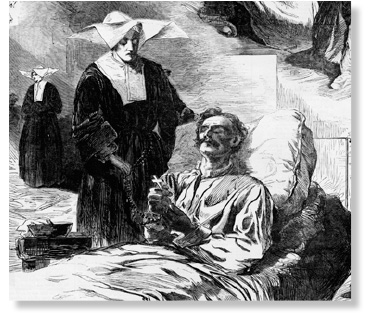Caring for the Wounded

The Civil War put women, young and old, in situations previously closed to them, such as nursing wounded soldiers on the battlefield and in hospitals.
During the Civil War, attitudes about women began to change. Left on their own, mothers and daughters managed farms and businesses. Near battlefields, they opened their homes to wounded soldiers.
In the 1800s, most families cared for the ill at home. But war prompted the creation of more public hospitals. Nursing in hospitals was considered dirty work, suitable only for the lower classes, and preferably men. But the shortage of manpower during the Civil War drew women of all ages into new roles. The common notion that women were supposed to be delicate and quick to faint at the sight of blood began to fade.
Not much is known about the roughly 2,000 women who volunteered as Civil War nurses, most of whom worked in towns well behind the battle lines. A few kept diaries, but military records mention only names.
Captured!
In 1863, 12-year-old Delity Powell Kelly and her mother followed her father, a Confederate artilleryman, so they could tend to the ill and wounded. Delity must have served near the front—retreating troops did not have time to load the wounded into wagons and transport them to safety—because she was captured twice. The first time Delity was caught, in Florida, she and her mother escaped by breaking a window. The second time, in Georgia, the Confederates traded five Union soldiers to get Delity back. After the war, the Florida legislature voted her a Confederate veteran’s pension for her bravery—the only one the state ever awarded a woman.
Emma Edmonds, a Union field nurse, described the horrors that Delity probably witnessed: “The sight of the [battle]field is perfectly appalling; men tossing their arms wildly calling for help; there they lie bleeding…. The ground is crimson with blood.”
Little Training
Seventeen-year-old Jennie McCreary, a Union sympathizer, wrote about her experiences during the Battle of Gettysburg, Pennsylvania, in a letter to her sister. “I went over to Weaver’s to help them roll bandages. We had not rolled many before we saw the street filled with wounded men.... I never thought I could do anything about a wounded man but I find I had a little more nerve than I thought I had.”
Both Northern and Southern nurses worked during the war with little support or training. In the 1860s, medicine was a primitive science. But nurses did what they could to relieve suffering, including sharing water from their canteens, changing bandages, and offering words of comfort.